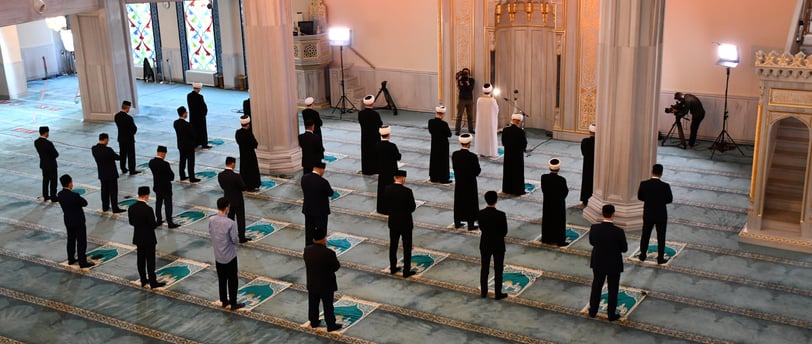Chast ki Namaz In Islam In English
Chast Ki Namaz holds significant importance. It not only serves as a means of communication with Allah but also offers a profound sense of peace and tranquility to the soul.
Vaseem Akram
7/19/20233 min read


CHAST KI NAMAZ: Embracing the Essence of Spiritual Connection
## Introduction
In the realm of Islamic practices, Salah holds an unshakeable place as one of the five fundamental pillars. Among the various prayers, Chast Ki Namaz holds significant importance. It not only serves as a means of communication with Allah but also offers a profound sense of peace and tranquility to the soul. In this article, we will delve into the essence of Chast Ki Namaz, exploring its importance, timings, and the verses that echo through the hearts of devout believers.
## 1. Understanding the Significance of Chast Ki Namaz
Chast Ki Namaz, also known as the Duha prayer, is a voluntary prayer performed after the sun has fully risen and before the time of Dhuhr prayer. It carries immense significance as it helps to seek forgiveness and blessings from Allah, renewing one's faith and strengthening the connection with the Divine. This spiritual act enables Muslims to cleanse their souls, providing a sense of direction and purpose in their lives.
## 2. The Timings of Chast Ki Namaz
The prime time to perform Chast Ki Namaz begins approximately fifteen minutes after the sun has fully risen, and it continues until just before the Dhuhr prayer time. The period of this prayer is characterized by the soft and gentle rays of the morning sun, which create a tranquil atmosphere for devotion and reflection. Embracing this time with sincerity allows believers to experience the bountiful grace and mercy of Allah.
## 3. The Essence of Chast Ki Namaz
Chast Ki Namaz involves four Rak'ahs, and the beauty of this prayer lies in the mindfulness and devotion with which it is performed. The verses recited during these Rak'ahs hold deep spiritual meanings that resonate within the heart of every believer. This prayer serves as a reminder of the continuous presence of Allah and fosters a sense of gratitude for the blessings bestowed upon one's life.
## 4. Immersing in the Tranquility of Chast Ki Namaz
Performing Chast Ki Namaz offers a unique opportunity to attain inner peace and tranquility. Amidst the chaos of the world, this prayer serves as a refuge, where believers can momentarily detach themselves from worldly affairs and seek solace in the serenity of devotion. This connection with the Divine nurtures emotional well-being, providing a sense of emotional stability and contentment.
## 5. The Power of Dhikr (Remembrance) during Chast Ki Namaz
Chast Ki Namaz is accompanied by Dhikr, the act of remembrance and glorification of Allah. Engaging in Dhikr during this prayer instills a sense of humility and gratitude, as it allows individuals to reflect upon the countless blessings bestowed upon them. The rhythmic recitation of verses amplifies the emotional experience, elevating one's consciousness towards spirituality.
## 6. Chast Ki Namaz: A Source of Hope and Healing
In times of distress and hardship, Chast Ki Namaz serves as a beacon of hope and healing. The prayer provides an avenue to seek guidance from Allah and seek solutions to life's challenges. The emotional aspect of this practice enables believers to release their burdens, finding solace in the knowledge that Allah is the ultimate source of support and strength.
7. Conclusion
Chast Ki Namaz holds immense importance in the lives of devout Muslims. It serves as a means of establishing a profound connection with Allah, finding solace in His presence, and seeking guidance through life's journey. Embracing the essence of this prayer not only brings emotional stability but also strengthens the bond between the individual and the Divine.
Frequently Asked Questions (FAQs)
Q1: Is Chast Ki Namaz obligatory like other daily prayers?
A1: No, Chast Ki Namaz is a voluntary prayer and not obligatory. However, it holds spiritual significance and offers numerous benefits to those who perform it regularly.
Q2: Can Chast Ki Namaz be performed at any time of the day?
A2: Chast Ki Namaz should be performed after the sun has fully risen and before the Dhuhr prayer time, which provides a specific timeframe for its performance.
Q3: How many Rak'ahs are there in Chast Ki Namaz?
A3: Chast Ki Namaz consists of four Rak'ahs, making it a spiritually enriching experience.
Q4: What should one recite during Chast Ki Namaz?
A4: During Chast Ki Namaz, believers can recite any verses from the Quran or engage in Dhikr (remembrance) to connect with Allah.
Q5: What emotional benefits can one derive from Chast Ki Namaz?
A5: Chast Ki Namaz offers emotional stability, tranquility, and hope, acting as a source of healing during challenging times.


